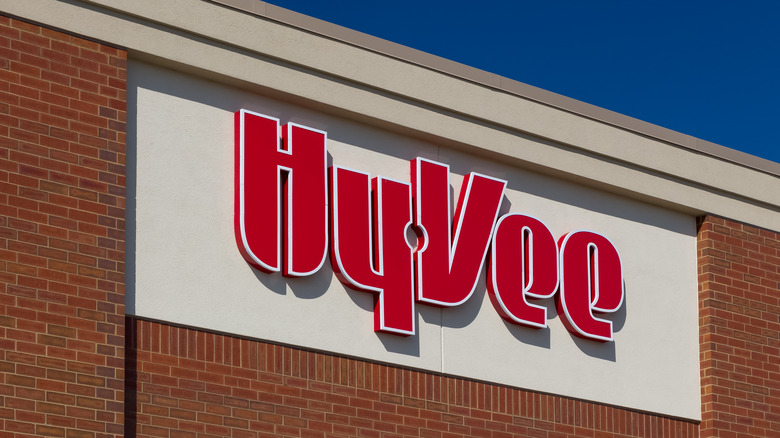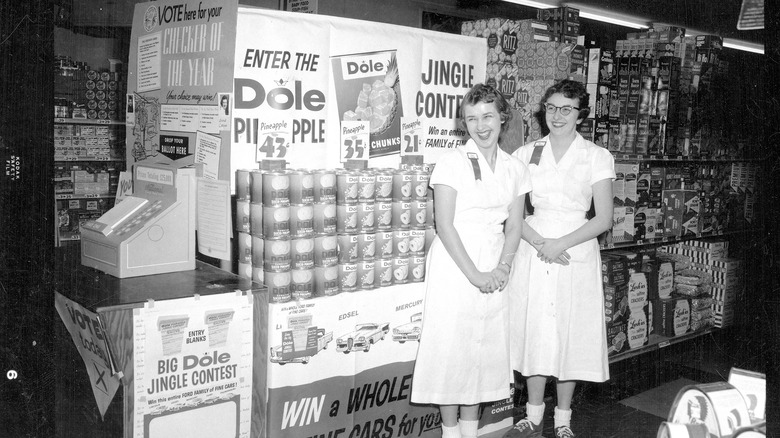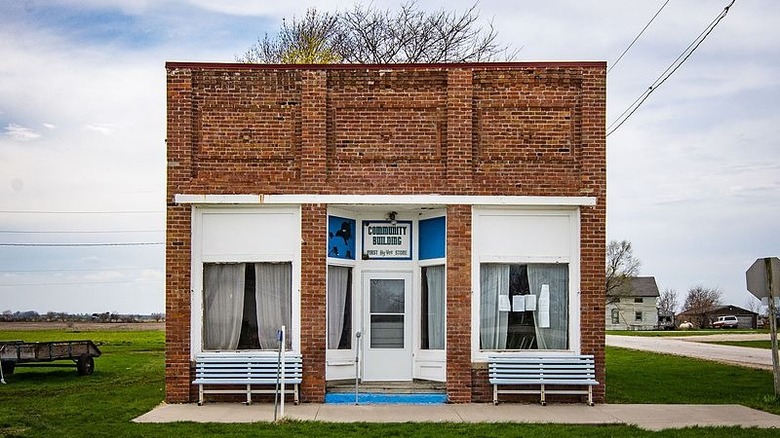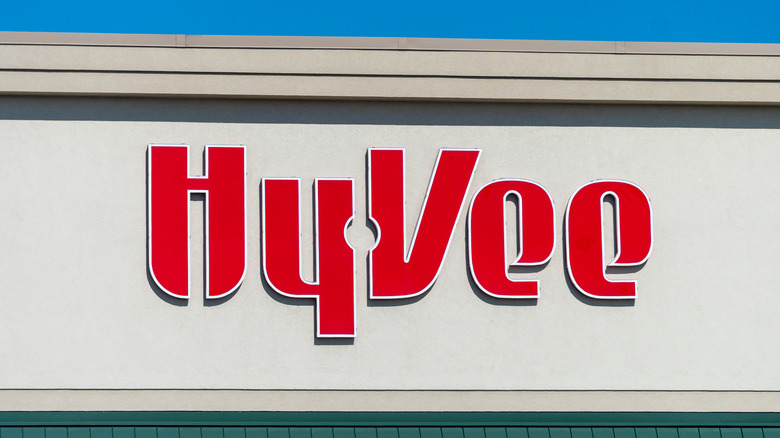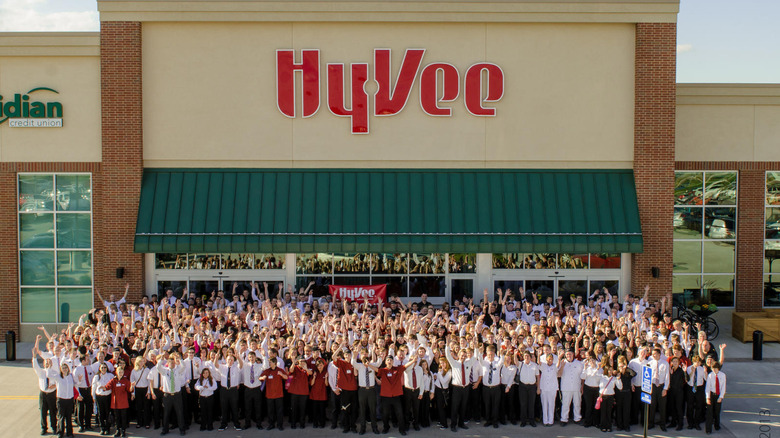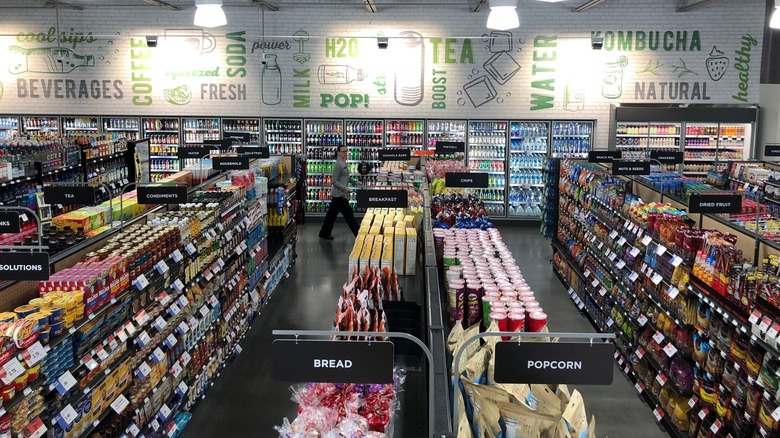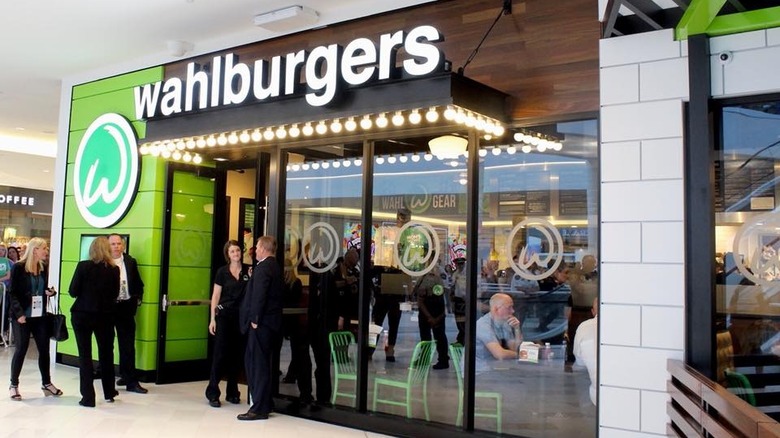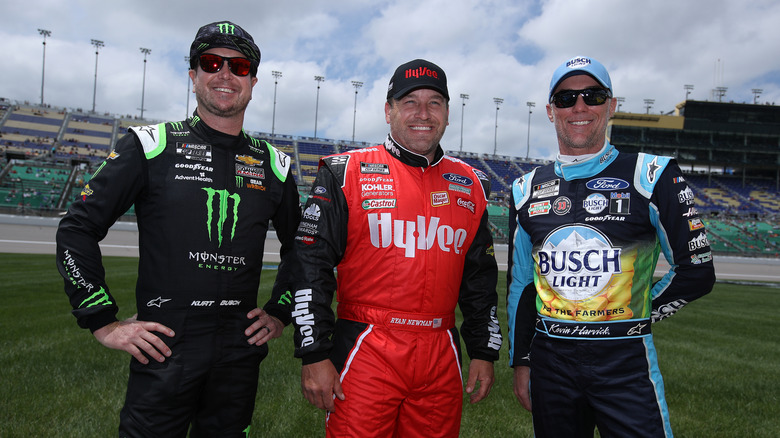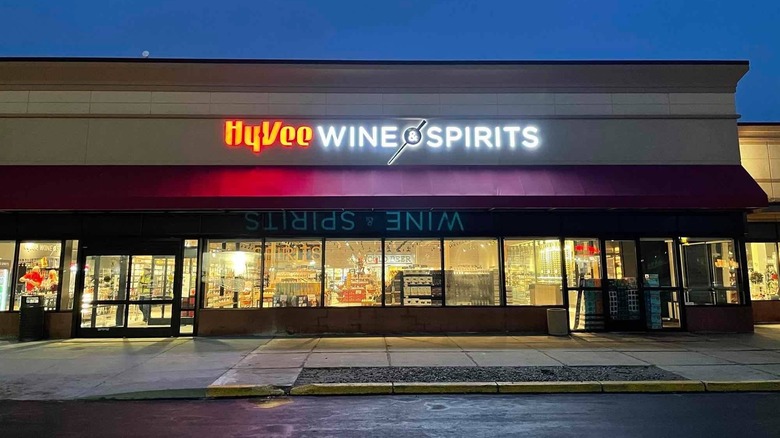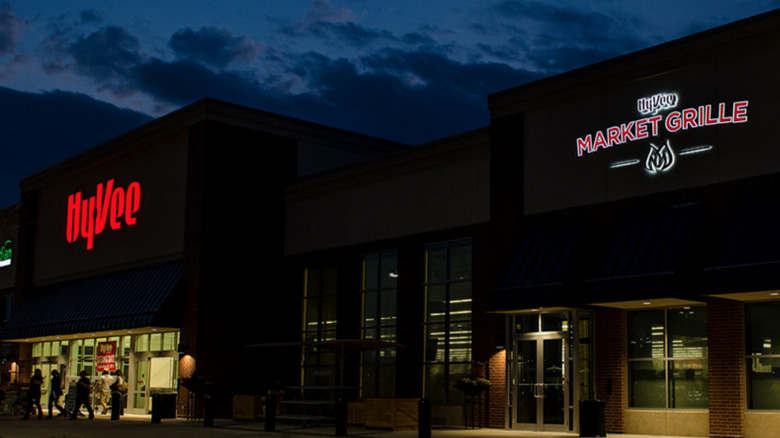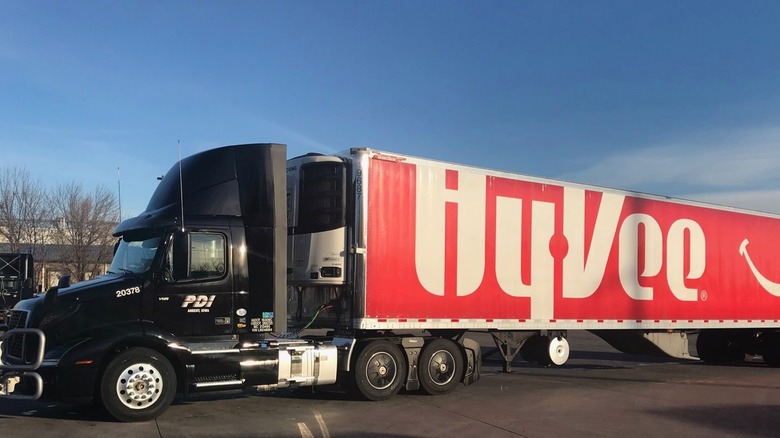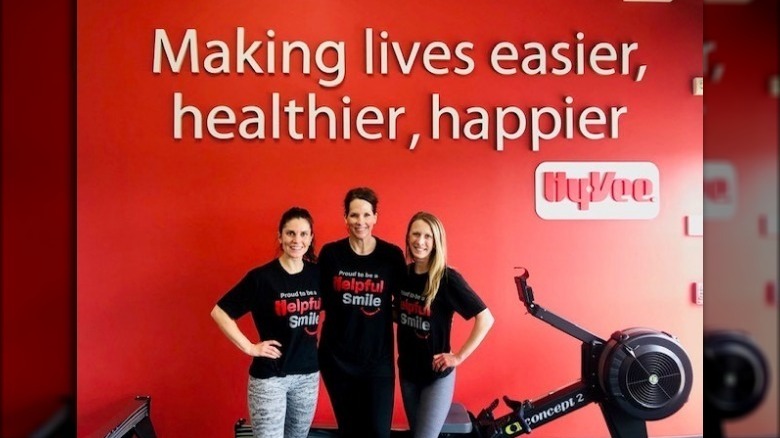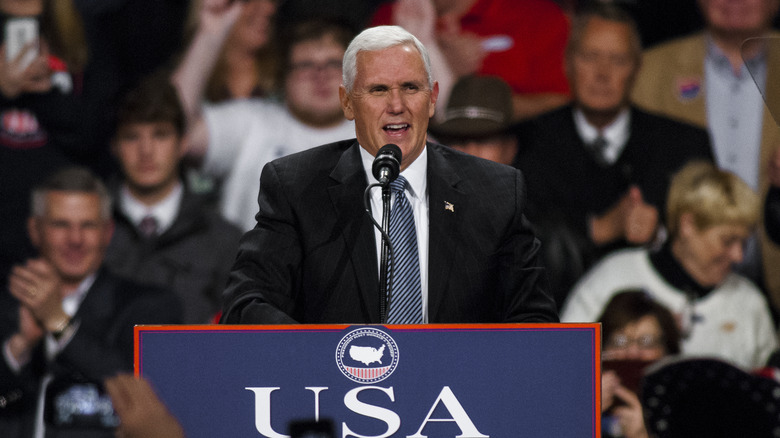The Untold Truth Of Hy-Vee
We all know about regional fast food chains, but did you know that many regional grocery stores are just as popular as their quick-serve brethren? Travel to seemingly any part of the United States, and you'll be sure to find a shop with a serious local following, like Florida's Publix or New York's Wegmans.
If you live outside of the Midwest, you may have never heard the name Hy-Vee, but that will likely change if the grocery store chain continues its expanding ways. What started as a single store in the Iowa countryside more than 90 years ago has grown into a company boasting more than 265 locations across eight states, not to mention annual sales of $10 billion. But Hy-Vee isn't stopping there. The company is crossing over into restaurants, convenience stores, and even the construction business, further cementing its place in the culinary landscape.
So what makes this growing empire so great? What secrets lie on the other side of those automatic sliding doors? From its unique ownership system and official historic status to its love affair with local sports teams and partnership with a popular burger chain, here's the untold truth of the Hy-Vee supermarket chain.
Hy-Vee first opened nearly a century ago as a general store
Now a massive, multi-state operation, Hy-Vee had the most humble of beginnings, one that can be traced back almost 100 years to a tiny Midwestern town. In 1930, entrepreneurs Charles Hyde and David Vredenburg opened a small general store in Beaconsfield, Iowa. It was appropriately named the "Beaconsfield Supply Store." The pair's timing was less than ideal. Just a few weeks after purchasing the property, before they even opened for business, the stock market crashed dramatically in what was the start of the Great Depression.
The country's struggling economic state during the 1930s didn't have much effect on Hyde's and Vredenburg's operation, however. By 1938, the duo owned 15 stores in Iowa and Missouri. That same year, the partners and store managers voted to incorporate the business, creating a new company known as Hyde & Vredenburg, Inc. For the next 14 years, the business continued to call all its locations "Supply Store." That all changed with a 1952 contest to rename the stores that brought a little more interest onto the facade of future markets. The winning entry was a contraction of the co-founders' surnames: "Hy-Vee."
The original Hy-Vee store is listed on the National Register of Historic Places
Hy-Vee has become such a success story that its original location is now an official part of history. The Beaconsfield Supply Store, as it was known when founders Charles Hyde and David Vredenburg owned it in the 1930s, was added to the National Register of Historic Places in 2007, according to the Iowa Department of Cultural Affairs. Per the National Park Service, the list is a compilation of historic places that have been deemed to be worthy of preservation. As such, this tiny brick structure built way back in 1916 still stands in the Iowa countryside, though it's clearly not playing host to a grocery store of any sort nowadays.
In 1933, Hyde and Vredenburg moved their business out of the Beaconsfield location on their way to expanding the company throughout the Midwest. While Hy-Vee has since grown exponentially, its hometown is suffering an opposing fate. According to the most recent stats from the U.S. Census Bureau, the population of Beaconsfield City, Iowa has dropped to a lonely 14 people. For comparison, Hy-Vee employs roughly 85,000 people.
Hy-Vee is one of the largest private companies in the country
From a humble general store, Hy-Vee has grown into not just one of the largest grocery store chains in the country, but one of America's largest private companies. According to Forbes, Hy-Vee brings in roughly $10.1 billion in revenue each year, making it the 38th largest private company in the United States, at least as that's measured by sales. Hy-Vee is also the third-largest chain in the food markets industry — only Publix and H-E-B have it beat. The chain's employee count of 85,000, meanwhile, is the 10th highest of all American private businesses.
According to Investopedia, private companies are those that don't trade publicly, meaning the general public cannot purchase ownership shares of the company in the form of stocks. Naturally, there are both pros and cons to going public or staying private. Companies open themselves up to a windfall of cash from stockholders when going public. Then again, owners of private companies get to keep all business' riches for themselves, which may be why Hy-Vee remains privately held.
Hy-Vee is employee-owned
Dating back to its inception, Hy-Vee has put its employees at the forefront of the company's success. In 1933, founders Charles Hyde and David Vredenburg began paying their store managers based on a profit-sharing system. Three years later, they started issuing employee bonuses, still a new concept at the time. The company made a fundamental shift in 1938, when a group of store managers incorporated as Hyde & Vredenburg, Inc. Ever since, Hy-Vee has been owned by the very same people who make it run: its employees.
So how exactly does this ownership system work? Some high-level employees, including officers, store directors, and executive staff members, personally own direct stock in Hy-Vee. Other employees own the company through the Hy-Vee and Affiliates 401(k) Plan. Instead of (or in addition to) investing in their own personal retirement fund, employees can opt to contribute part of their paycheck to the Hy-Vee plan, which is the company's largest shareholder.
More than 45,000 Hy-Vee employees currently participate in the program, which is generally accepted as a win-win for both parties. The company can use the funds its workers invest to help grow the business today. In doing so, Hy-Vee becomes more valuable, as do its shares. This, in turn, should give employees more money when they reach retirement age.
Hy-Vee has several different store formats
In 2017, Hy-Vee debuted a brand-new store model in downtown Des Moines, Iowa, called Fourth + Court (via Supermarket News). It was the latest in a string of attempts to appeal to a new demographic: younger, city-living customers more likely to buy dinner ingredients on their way home from work than stock up on a week's worth of groceries in a single trip. The store, which is on the ground floor of an apartment building, features four restaurant offerings, an extensive selection of grab-and-go items, and devotes six aisles to beer, wine, and liquor (via Grocery Dive). The very next year, Hy-Vee unveiled its first HealthMarket store, a standalone marketplace that sells healt conscious and wellness-based items like cauliflower rice and kombucha, alongside more traditional groceries.
Hy-Vee's most prominent format extension, however, is Fast & Fresh, an elevated convenience store concept, many of which have adjoining fuel stations. These locations provide on-the-go customers with higher quality food and drink options than the typical Twinkie and soda types of offerings at a gas station. There, you can pick up fresh produce and bakery items, premium coffee, and prepared meals like salads, sandwiches, and even sushi. (This may just be the only gas station sushi that's acceptable to eat.) Hy-Vee also operates a growing number of Dollar Fresh stores, a deep-discounted grocery outlet. According to Progressive Grocer, the company plans to open 14 new Dollar Fresh stores in 2021, along with 11 Fast & Fresh locations.
Hy-Vee owns several Wahlburgers restaurants
In case Hy-Vee wasn't offering enough products and services, it's now bringing customers burgers in the form of Wahlburgers. In 2017, The Gazette reports, Hy-Vee announced that it was partnering with the Boston-based chain, owned by chef Paul Wahlberg and his two famous brothers, actor Mark Wahlberg and former New Kids on the Block member Donnie Wahlberg.
As part of the agreement, Hy-Vee would own and operate more than two dozen Wahlburgers restaurants across seven Midwestern states, according to The Gazette. The first location — featuring some signature burgers — opened in the Mall of America in 2018.
The second component of the partnership allowed the supermarket chain to sell Wahlburger items at its in-store restaurant, Market Grille. This proved to be what the people wanted as, in 2020, Hy-Vee announced that it would be converting all 21 of its Market Grille eateries into Wahlburgers restaurants. "Our customers are wanting more fresh and convenient meal options," Hy-Vee public relations director Christina Gayman told Supermarket News. As of December 2020, the grocery store chain had six Wahlburgers in operation with plans to open 24 more restaurants by the end of 2021.
Hy-Vee sponsors numerous sports teams and arenas
You'll be hard-pressed to watch a Midwestern sporting event without being bombarded with the Hy-Vee logo. That's because, for years, the grocery store chain has sponsored countless sports teams, arenas, and events throughout the region.
In 2015, Hy-Vee was named a founding partner of U.S. Bank Stadium, home of the National Football League's Minnesota Vikings. The 10-year agreement includes "prominent signage throughout the stadium as well as opportunities for branded concessions and specialty food offerings," according to a company statement. The grocery giant also partnered with the National Hockey League's Minnesota Wild that same year. These moves were part of Hy-Vee's marketing push to promote its first store in the Twin Cities. "Sports marketing is important to us," Donna Tweeten, Hy-Vee senior vice president and chief marketing officer, told Supermarket News. "In the states we operate in, there is a strong community connection to these teams. These tie-ins allow us to really get behind the community, and support them as they support their teams."
The push appears to have worked. In 2017, Hy-Vee became the official grocery, pharmacy, and floral partner of three pro basketball teams: the Minnesota Timberwolves, Minnesota Lynx, and Iowa Wolves. Racecar fans, meanwhile, are very familiar with seeing the Hy-Vee logo circle the track. The company has sponsored cars in both NASCAR and IndyCar. It's not just the professionals, though. Hy-Vee partners with dozens of college athletic programs events, such as the annual Iowa-Nebraska football game.
Hy-Vee liquor stores are sometimes separate
Hy-Vee operates in eight Midwestern states — Illinois, Iowa, Kansas, Minnesota, Missouri, Nebraska, South Dakota, and Wisconsin. Some of these states happen to have strict laws dictating the sale of alcohol. These regulations usually include statutes prohibiting grocery and convenience stores from selling beer, wine, and liquor on the premises or on Sundays. As such, many Hy-Vee locations selling alcohol have to do so from a building that is carefully separate from its grocery store (via Supermarket News).
The most notable example of this is quite possibly in Prairie Village, Kansas. According to The Pitch, while most Hy-Vee customers simply have to exit the grocery store and walk next door to buy their booze, patrons at this particular location actually have to cross state lines. That's because Kansas' restrictive alcohol laws haven't evolved all too much over the last 100 years. In fact, it's one of the few states that never ratified the 21st Amendment, which ended Prohibition.
To this day, you still can't buy wine or liquor in a Kansas grocery store. You couldn't even get beer higher than 3.2 percent alcohol until 2019, according to NPR. To circumvent these laws, Hy-Vee built its wine and liquor store across the street from its grocery business. The street, aptly named State Line Road, forms the border between Kansas and Missouri. Because it's technically located in the neighboring state, Hy-Vee is free to abide by Missouri's much more relaxed alcohol laws, which include extended operating hours.
Hy-Vee stores used to be open 24 hours
For a long time, one of the many unique features of Hy-Vee that made it stand out from the rest of its supermarket competition was the fact that Hy-Vee locations were once open 24 hours a day. But apparently, this was more popular in theory than in practice. In 2020, the company announced that it would be ending its 24-hour service at most of its more than 265 stores.
Why the slow down? "Customer traffic drops off overnight, so we made the decision to relocate the shifts to better accommodate our customers and the lives of our team members," Hy-Vee spokeswoman Christina Gayman told the Des Moines Register. In keeping its employees' well-being in mind, Hy-Vee announced that none of its workers would be laid off because of the change, according to USA Today. Instead, they would simply be moved to other shifts. Grocery stockers and other non-public-facing workers would continue to work overnight.
That's not to say there are no more all-hours Hy-Vee locations out there. There are still a handful of Hy-Vee stores open throughout the night, but most locations now close at midnight and reopen the next morning at 5 a.m.
Hy-Vee has several subsidiary businesses
Diversifying its operations has always been in the Hy-Vee company's plan. Even while they were still getting the business off the ground, founders Charles Hyde and David Vredenburg were operating an office, warehouse, mill, bakery, and meat plant. This philosophy has remained in place to this day. Over the years, Hy-Vee has not only expanded its bread and butter grocery operation, but it's also branched out into other industries in the form of several subsidiary companies. In 1982, for instance, it established Perishable Distributors of Iowa, LTD. This distribution center allows Hy-Vee to provide its stores with perishable products in a timely and cost-effective manner. It also owns D & D Foods, Inc., which supplies meats, dips, and salads.
But Hy-Vee isn't just in the food business anymore. In order to satisfy its growing need for more brick-and-mortar stores, the chain founded Hy-Vee Construction, a general contractor and construction management company, in 1995. To date, it's built roughly six million square feet of retail, warehouse, and food processing space. More recently, Hy-Vee took ownership of Amber Pharmacy, a chain of more than 20 pharmacy locations. Rounding out the grocery giant's ballooning subsidiary portfolio are Midwest Heritage Bank and Florist Distributing, Inc.
Hy-Vee is all about a healthy lifestyle
Most grocery stores just want customers to buy, buy, buy. And, if junk food is on the agenda and a few grocery lists, so be it. But Hy-Vee has gone above and beyond such goals and has begun offering customers programs and services to improve their health. After all, how many grocery outlets employ full-time dietitians? That's right — many Hy-Vee locations actually have qualified nutritionists on staff and on-premises. These professionals provide customers with free or otherwise inexpensive services like health screenings, nutrition counseling, meal planning, and health-focused tours of the grocery store. Hy-Vee hasn't forgotten about the little ones, either. In 2015, the company launched its KidsFit program, which offers at-home and in-school nutritional programming for young folks.
If all this wasn't enough, Hy-Vee is also getting into the fitness center business. The company owns Hy-Vee Fitness, a 24-hour gym that's located right next door to one of its Des Moines, Iowa stores. "Hy-Vee Fitness is another step in our company's commitment to health and wellness," senior vice president of retail health Andy McCann said in a company statement. "A facility like this, coupled with Hy-Vee's growing roster of dietitians and an established emphasis on fresh, wholesome food, creates a comprehensive approach to wellness and represents the core of our business." The chain also operates Hy-Vee Arena, a state-of-the-art sports complex in Kansas City, featuring a fitness center, basketball court, and indoor track.
Hy-Vee has been accused of partisan politics
On more than one occasion, Hy-Vee has been accused of political favoritism. Although the company claims to be bipartisan, Hy-Vee's actions in recent years, including hosting GOP events at Hy-Vee locations, seem to veer in favor of the Republican Party. In 2019, Hy-Vee's Political Action Committee (PAC) wrote a $25,000 check to the Republican Party of Iowa. The PAC claims its choices are based on issues, not political parties, and that it has donated to candidates of both sides of the aisles. But according to OpenSecrets.org, Hy-Vee's contributions to Republicans far outweigh those it's made to Democrats. During the 2020 election cycle, for example, it gave $31,500 to the former and just $7,500 to Democrats.
This alleged Republican favoritism came to a head in 2020, when Hy-Vee CEO Randy Edeker sent the company's 85,000 employees a video (via Iowa Capital Dispatch). In it, the executive not so subtly endorsed Donald Trump for a second term. It turns out, while most of the world was trying to escape 2020, Hy-Vee was thriving, bringing in nearly $1 billion more in sales than the year before. Edeker simply didn't want things to change.
Though he was free to express his opinion, Edeker's video couldn't have been welcomed by all. "I think it could have a chilling effect," political attorney Gary Dickey told the Iowa Capital Dispatch. "I don't know how many employees feel comfortable publicly supporting candidates directly contrary to views expressed by the company's CEOs."
